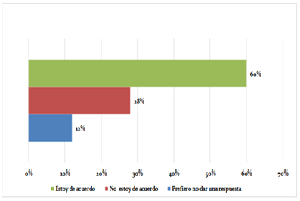The conscientious objection as a defense against criminal liability
DOI:
https://doi.org/10.51252/rcri.v2i2.391Keywords:
illegality, crime, freedom of conscience, criminal liabilityAbstract
The delimitation of cases where conscientious objection applies as justification to exempt from criminal liability, in the event of non-compliance with legal duties or obligations, generates a criminal sanction; taking into account the moral and subjective rights that accompany them; therefore, it is not a legal fact because it is recognized by law, but respect for one's own identity is recognized. The objective of the study was to determine how the regulation of conscientious objection as a defense against criminal responsibility would help to declare no criminal responsibility; For this, a basic, non-experimental type study with a quantitative approach was carried out, as well as the application of a duly validated questionnaire to a sample of 60 professionals with knowledge in criminal law. The results showed that conscientious objection must be considered a fundamental right that must be protected and contained in the constitution. In conclusion, we are faced with a constitutionally recognized right, linking it with the principle of immunity from coercion with the right to freedom of conscience and the right to dignity.
Downloads
References
Acosta-Alvarado, M. J. (2022). La objeción de conciencia y la responsabilidad Medica: Una realidad axiológica y jurídica. [Universidad Católica de Colombia]. https://repository.ucatolica.edu.co/handle/10983/27375
Alvarado, C., Contreras, F., & Svensson, M. (2018). Objeción de conciencia institucional. https://www.ieschile.cl/wp-content/uploads/2018/07/Objeción-de-conciencia-instirucional-4-claves-para-el-debate.pdf
Álvarez Gálvez, Í. (2017). Algunas notas sobre el concepto de objeción de conciencia. Atenea (Concepción), 516, 121–134. https://doi.org/10.4067/S0718-04622017000200121
Alvites, E. (2018). La constitucionalización del ordenamiento jurídico peruano: avances y obstáculos del proceso. Derecho PUCP, 80, 361–390. https://doi.org/10.18800/DERECHOPUCP.201801.010
Bendezú Barnuevo, R., Erazo Saro, E. J., Guimaray Mori, E., Villegas Paiva, E. A., Pérez López, J. A., Bassino Balta, A., Yvancovich Vásquez, B. S., Sánchez Córdova, J. H., & Velásquez Delgado, P. (2014). Las causales eximentes de responsabilidad penal. Gaceta Juridica . https://www.docdroid.net/wKqiCon/las-causales-eximentes-de-responsabilidad-penal-pdf-pdf
Campoverde Nivicela, L. J., Orellana Izurieta, W. G., & Sánchez Cuenca, M. E. (2018). El concepto y las funciones de la acción como elemento de la teoría del delito . Universidad y Sociedad, 10(2), 310–317. https://rus.ucf.edu.cu/index.php/rus/article/view/869
Código Penal, (2020) (testimony of Decreto Legislativo N°635). https://diariooficial.elperuano.pe/pdf/0034/codigo-penal-29.07.2020.pdf
Espinoza Ariza, J. (2019). El estándar de prueba en el proceso penal peruano. Lex: Revista de La Facultad de Derecho y Ciencia Política de La Universidad Alas Peruanas, 17(24), 85–102. https://doi.org/10.21503/LEX.V17I24.1812
Estrada, G. (2017). Lo legal no siempre es moral . El Tiempo. https://www.eltiempo.com/opinion/columnistas/gustavo-estrada/lo-legal-no-siempre-es-moral-138814
Figueroa Gómez, W., & Zuluaga Suárez, P. L. (2012). La objeción de conciencia como causal de ausencia de responsabilidad en la jurisdicción penal militar [Universiad Libre]. https://repository.unilibre.edu.co/handle/10901/7547
García Toma, V. (2016). El Estado y la libertad de conciencia. Forseti. Revista de Derecho, 6, 9–21. https://doi.org/10.21678/FORSETI.V0I6.1117
Hernández Sampieri, R., Fernández Collado, C., & Baptista Lucio, P. (2014). Metodología de la investigación (McGraw-Hill Education (ed.); Sexta Edic).
Montano, P. J. (2017). La objeción de conciencia como causa de justificación. Revista de Derecho (Universidad Católica Dámaso A. Larrañaga, Facultad de Derecho), 1(15), 113–142. https://doi.org/10.22235/RD.V1I15.1379
Ovalle Bazán, M. I. (2019). La dignidad humana como límite al ius puniendi. La jurisprudencia del tribunal constitucional de Chile. Díkaion, 28(1), 35–68. https://doi.org/10.5294/DIKA.2019.28.1.2
Posada Maya, R. (2018). La objeción de conciencia como eximente de la responsabilidad penal en Colombia. Nuevo Foro Penal, 14(90), 103–133. https://doi.org/10.17230/nfp.14.90.3
Rojas Aguirre, L. E. (2021). Regreso a una teoría formal del deber jurídico en el ámbito de la omisión impropia. Revista de Derecho (Coquimbo), 28, e4871. https://doi.org/10.22199/ISSN.0718-9753-2021-0008
EXP. N.o 00012-2008-PI/TC, (2008) (Sentencia del Tribunal Constitucional). https://www.tc.gob.pe/jurisprudencia/2010/00012-2008-AI.html
Silva Abbott, M. (2015). El incierot futuro de la libertad de expresión en el sistema interamericano de derechos humanos. Revista Chilena de Derecho, 42(3), 1063–1096. https://doi.org/10.4067/S0718-34372015000300013
Takemura, H. (2022). Conscientious Objection, Ethics of. Encyclopedia of Violence, Peace, & Conflict, 268–275. https://doi.org/10.1016/B978-0-12-820195-4.00088-1
Zambrana González, L. A. (2015). Delimitacion y tratamiento de la objecion de conciencia en la negativa a recibir tratamiento medico . https://www.academia.edu/45682839/Delimitacion_y_tratamiento_de_la_objecion_de_conciencia_en_la_negativa_a_recibir_tratamiento_medico

Published
How to Cite
Issue
Section
License
Copyright (c) 2022 Rosa Isabel Flores-Chávez

This work is licensed under a Creative Commons Attribution 4.0 International License.
The authors retain their rights:
a. The authors retain their trademark and patent rights, as well as any process or procedure described in the article.
b. The authors retain the right to share, copy, distribute, execute and publicly communicate the article published in the Ratio Iure Scientific Journal (RCRI) (for example, place it in an institutional repository or publish it in a book), with an acknowledgment of its initial publication in the RCRI.
c. Authors retain the right to make a subsequent publication of their work, to use the article or any part of it (for example: a compilation of their works, notes for conferences, thesis, or for a book), provided that they indicate the source of publication (authors of the work, journal, volume, number and date).






